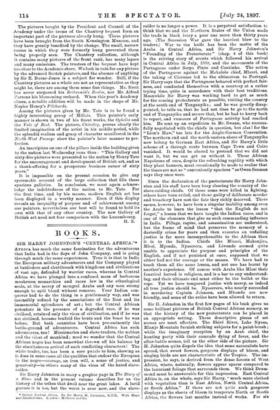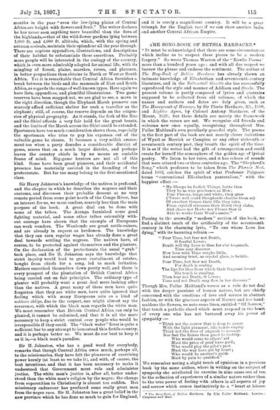BOOKS.
SIR HARRY JOHNSTON'S "CENTRAL AFRICA." AFRICi has much the same fascination for the adventurous that India had in the days of John Company, and is going through much the same experiences. True it is that in India the European military adventurers and the Company played at battledore and shuttlecock with kingdoms and civilisations of vast age, defended by warrior races, whereas in Central Africa we have plunged into a confused mass of barbarous mushroom monarchies and races low in the ethnological scale, at the mercy of mongrel Arabs and any man strong enough to spill blood without remorse. Your Indian con- queror had to do the thing in a gentlemanly way, and was insensibly refined by the associations of the East and its immemorial splendours of art ; but the Central African potentate in the presence of a degraded race, if he was civilised, retained only the vices of civilisation, and if he was not civilised, became tenfold the brute and the beast he was before. But both countries have been pre-eminently the battle-ground of adventurers. Central Africa has such adventurers, too ! Missionaries and slave-traders, the noblest and the vilest of mankind ; need we wonder that the Central African negro has been somewhat thrown off his balance by the simultaneous arrival of such conflicting characters ! The white trader, too, has been a sore puzzle to him, showing as it does in some cases all the qualities that endear the European to the negro—courage, an iron will, a sense of justice, and generosity—in others many of the vices of the hated slave- raider.
Sir Harry Johnston in many a graphic page in The Story of a Slave and in the present volume describes for us the history of the tribes that dwell near the great lakes. A lurid picture it is too, but the worst is over now, and the slave- • British Central Africa. By Sir Harry H. Johnston, K.O.B. With Maps
and illustrations. : Methuen and Co.
raider is no longer a power. It is a perpetual satisfaction tc think that we and the Northern States of the Union made the trade in black ivory a poor one more than thirty years ago. (The Secession War gave the heaviest blow to the traders.) War to the knife has been the motto of the Arabs in Central Africa, and Sir Harry Johnston's "Founding of the Protectorate" (chap. 4 of this book) is the stirring story of events which followed his arrival in Central Africa in July, 1889, and the movements of the Portuguese under Serpa Pinto and Coutinho. The action of the Portuguese against the Makalolo chief, Mlauri, and the taking of Chiromo led to the ultimatum to Portugal. Sir Harry says that the Portuguese behaved with perfect fair- ness, and conducted themselves with a courtesy at a rather trying time, quite in accordance with their best traditions. Meanwhile Sir Harry was working hard to get as much for the coming protectorate as possible, visiting the country at the south end of Tanganyika ; and he was greatly disap- pointed, he tells us, that he had not time to go to the north end of Tanganyika and secure that, but he had to hurry back to report, and rumours of Portuguese activity had reached him. He sent up an expedition to Mr. Swann, who success- fully negotiated with the chiefs in question, but alas ! for the 'Lion's Maw," too late for the Anglo-German Convention. The northern end and the north-eastern shore of Tanganyika now belong to German East Africa, and Sir Harry's little scheme of a through route between Cape Town and Cairo vanished. It would be absurd to pretend that we did not want it, but we can get on withont it. These African Napoleons of ours, despite the refreshing rapidity with which they plant banners, must occasionally be made to realise that the times are not so "conveniently spacious "as Owen Seaman says they once were.
Since the declaration of the paotectorate Sir Harry John- ston and his staff have been busy clearing the country of the slave-raiding chiefs. Of these some were killed in fighting, others have been exiled, and those guilty of deliberate murder and treachery have met the fate they richly deserved. There seems, however, to have been a singular inability among even the Arabs to learn the lesson "that the English do not forget," a lesson that we have taught the Indian races, and is one of the elements that give us such commanding influence in India. Pillage, rapine, and assassination are understood, but the frame of mind that preserves the memory of a dastardly crime for years and then executes an unfailing justice is far more incomprehensible to the African than it is to the Indian. Chiefs like Miauri, Makanjira, Mlosi, Mponda, Nyaserera, and Liwonde seemed quite unable to appreciate the purpose and principles of the English, and if not punished at once, supposed that we either had not the courage or the means. We have had to teach them all the same lesson, and not one has learnt by another's experience. Of course with Arabs like Mlosi their fanatical hatred is religious, and is a bar to any understand- ing, and their ultimate end must either be the bullet or the rope. Yet we have tempered justice with mercy, as indeed all true justice should be. Nyaserera, who nearly succeeded in murdering Captain Johnson, and Mkanda are now friendly, and some of the exiles have been allowed to return.
Sir H. Johnston in the first few pages of his book gives us some brilliant pictures of British Central African scenery, so that the history of the new protectorate can be placed in an appropriate setting. These descriptive pieces of set scenes are most effective. The Shire River, Lake Nyasa, Mlanje Mountain furnish striking subjects for a paint-brush ; while the imaginary reception by an Arab chief, the hunting party with their comrade dying of fever, and the after-battle scenes, tell us the other side of the picture. Sir H. Johnston quite dispels the idea that some naturalists have spread, that sweet flowers, gorgeous displays of bloom, and singing birds are not characteristic of the Tropics. The im- pression, he says, is derived from the dense forests of West Africa, where, naturally, flowers appear sparse compared to the luxuriant foliage that surrounds them. We think Drum- mond must be answerable for this impression. East Central Africa is, on the whole, says Sir Harry, "much more clothed with vegetation than is East Africa, North Central Africa, or South Africa." If there are not quite such gorgeous displays as the sheets of bloom in temperate North or South Africa, the flowers last months instead of weeks. For six months in the year "even the low-lying plains of Central Africa are bright with flowers and fruit." The writer declares he has never seen anything more beautiful than the flora of the highlands,—that of the wild-flower gardens lying between 1,000 ft. and 4,000 ft. altitude, which, with the spring and autumn revivals, maintain their splendour all the year through. There are copious appendices, illustrations, and descriptions of their habitat to substantiate these assertions. Probably more people will be interested in the zoology of the country, which is even more admirably adapted for animal life, with its mingling of forest, plains, marshes, rivers, and plateaux, in better proportions than obtains in North or West or South Africa. Yet it is remarkable that Central Africa furnishes a break between the birds and the mammals of East and South Africa, as regards the range of well-known types. Here again we have lists, appendices, and plentiful illustrations. Two game reserves have been mapped out, we are glad to see, a move in the right direction, though the Elephant Marsh preserve can scarcely afford sufficient shelter for such a traveller as the elephant; still, of course, the reserve depends on the exigen- cies of physical geography. As it stands, the fork of the Ruo and the Shire affords a very fair hold for the great beasts, and the limits of the Marsh across the Shire could be extended. Sportsmen have too much consideration shown them, especially the sportsman who tries to pay his expenses out of the valuable game he shoots. It becomes a very selfish amuse- ment too when a party denudes a considerable district of game, scares that on a much larger district, and perhaps leaves the country chiefs in by no means an amiable frame of mind. Big-game hunters are not all of this kind. Some have been great pioneers, and their accidental presence has materially assisted in the founding of the protectorate. But far too many belong to the first-mentioned class.
Sir Harry Johnston's knowledge of the natives is profound, and the chapter in which he describes the negroes and their customs, and discusses their probable descent at no very remote period from some point north of the Congo River, has an interest for us, we must confess, scarcely less than the main purpose of the book. A great deal can be done with some of the tribes. The Atonga furnished some good fighting material, and some other tribes ostensibly with- out courage have shown that the example of Europeans can work wonders. The Wankonde are great cattle-raisers, and are already in request as herdsmen. The knowledge that they can earn regular wages has already done a great deal towards settling the negroes. The natives have, of course, to be protected against themselves and the planters. On the declaration of the protectorate the usual " grab " took place, and Sir H. Johnston says the knowledge that strict inquiry would lead to great curtailment of estates, bought from chiefs for a song, led to much irritation. Matters smoothed themselves down pretty well, and there is every prospect of the plantation of British Central Africa being carried out on fair principles. The ordinary type of planter will probably want a great deal more looking after than the natives. A great many of these men have quite forgotten that they are white men, have quite ignored that feeling which with many Europeans acts as a kind of noblesse oblige, due to the respect, one might almost say the reverence, with which the black man regards the white man. We must remember that British Central Africa can only be planted, it cannot be colonised, and that it is all the more necessary to keep a strict control over people who would be irresponsible if they could. The "black water" fever is quite a sufficient bar to any attempt to homestead this fertile country, and it is perhaps better so. We must do our best to keep it as it is,—a black man's paradise.
Sir H. Johnston, who has a good word for everybody, remarks that though Central Africa owes much, perhaps all, to the missionaries, they have felt the pleasures of exercising power keenly (at least so we take it), and with, of course, the best intentions, and that it has been necessary to make it understood that Government must rule and administer justice. The white man's justice is, after all, better under- stood than the white man's religion by the negro ; the change from superstition to Christianity is almost too sudden. But missionary endeavour has produced some really great men from the negro race. Sir H. Johnston has a great belief in the new province which he has done so much to gain for England, and it is surely a magnificent country. It will be a great triumph for the English race if we can show another India and another Central African Empire.



































 Previous page
Previous page